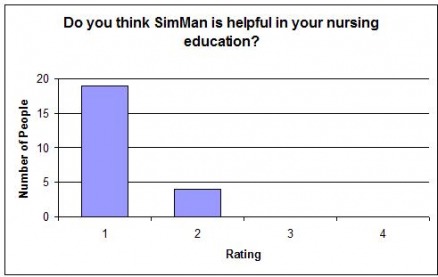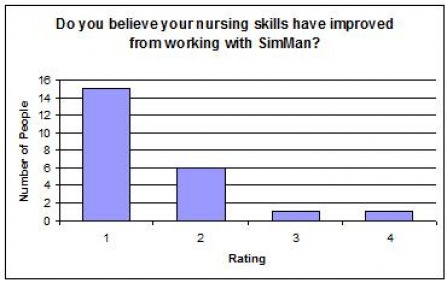SimMan at Bethel
Follow this link to an interview with Marilyn Hedstrand! Marilyn is Nursing Lab Coordinator for the Nursing Department at Bethel University and was kind enough to give us an interview regarding Bethel's SimMan.
Listen Now!
Nursing Students Opinions on SimMan
As a part of our website we wanted to get nursing student's opinions on their experiences with SimMan. The purpose of this survery was to see if nursing students see SimMan as an integral part of their nursing education. We surveyed 23 junior nursing students at a private university in Minnesota. These nursing student's have at least spent an hour or more with SimMan in a simulation scenario. The students were asked to rate seven questions on SimMan on a scale of 1 to 4 (1= yes, very, 2= somewhat, 3= maybe a little/not much, 4= no). The seven questions are presented below with the average rating that the 23 students gave.
Questions:
1) Generally, do you think SimMan is helpful in your nursing education? average rating= 1.2 (See graphical representation at the bottom of the page)
2) Generally, do you find SimMan prepares you for clinical settings? average rating= 1.6
3) Do you believe your nursing skills have improved from working with SimMan? average rating= 1.5 (See graphical representation at the bottom of the page)
4) Do you feel SimMan makes you more confidents in your skills? average rating= 1.3
5) Do you find SimMan to be realistic representation of actual clinical settings? average rating= 1.9
6) Does Working with SimMan make you feel anxious/nervous? average rating= 2.3
7) If you were designing a nursing education curriculum would you include SimMan? average rating= 1.2
We then asked the students two short answer questions. Below are a list of the common answers we got to the questions.
1) In what ways do you dislike SimMan as a part of your education?
- Things that were commonly disliked included SimMan not being used enough, nervousness created by being observed by peers and professors when using SimMan, not having clear instructions on what to do with SimMan, SimMan not being realistic, having to work with SimMan ends up taking a day away from clinical with real patients, difficult to differentiate lung sounds on SimMan, the inability to see physical symptoms that are seen from appearance of a patient, simulation takes a long time to set up and prepare for and difficulty in conversation with SimMan and therefore it makes it difficult to interact as if he was a patient.
2) In what ways do you like SimMan as a part of your education?
- Things that were commonly liked included that the experience is controlled, being able to make mistakes without harming a real patient, makes real life clinical more comfortable because of prior experience with SimMan, allowed to practice several medical scenarios on one patient, makes you think critically and quickly about possible complications your patient could have, provides a good learning experience and allows the nursing student to play the role as nurse and not nursing student.
Overall, what we found in our research was that nursing students really enjoyed their experience with SimMan and believed that their experience was one of learning. Although SimMan cannot be fully realistic he allows student's to practice several realistic scenarios without having to worry about hurting a real patient. Not one student we surveyed said that they gained nothing from SimMan. Every student took something away and I believe this has something to say about how simulation can positively impact nursing education.


